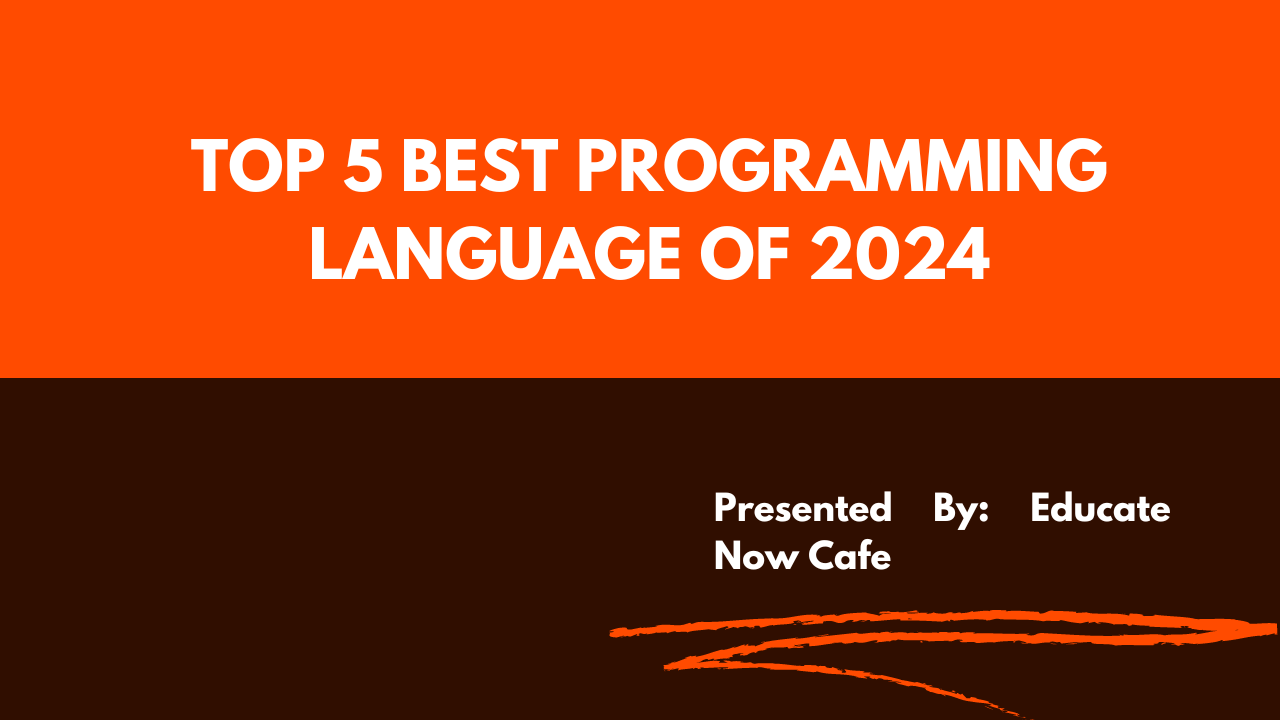One Of The Best Programming Language Of 2024
What Is Programming Language?
A programming language allows developers and programmers to communicate with computers and other devices (like IoT) using machine-understandable code. There are numerous programming languages worldwide, each created for specific features. When a language is written, it needs to be translated into bytecode and machine code for the computer to execute it. According to data, there are over 700 different programming languages that can be used to interact with machines. Choosing the right programming language and expanding your knowledge of the ones you already know can enhance your resume and make you stand out from other candidates.
Here are five popular programming languages that we believe can give you an edge in your career in 2024.
1. C++
C++ is a widely recognized programming language known for its use in game development, system programming, and high-performance applications. Created by Bjarne Stroustrup, C++ has seen significant updates in 2011, 2014, 2017, and most recently in 2022. You’ll find C++ in a variety of areas, including graphical user interfaces, embedded systems, and operating systems. The language is relatively easy to learn, especially if you’re familiar with Java, C, or C#.
2. Python
Python, created by Guido van Rossum in 1991 and inspired by the ABC language, is a versatile and high-level programming language. As an open-source language, it’s maintained by the Python Software Foundation (PSF). Python’s widespread use spans platforms and companies like Google App Engine, Maya, YouTube, Google Search, and iRobot machines. Although Python may not match the speed of languages like C and C++, its rapid development cycle makes up for this difference.
Python’s Distinctive Features
- Pre-compiled Code: Python code is pre-compiled, allowing for direct execution without assembly.
- Simple Syntax: Compared to Java and C++, Python’s syntax is straightforward and easy to understand.
- Vast Standard Library: Python boasts a comprehensive standard library and embraces an open-source ethos.
- Object-oriented Approach: This approach simplifies learning and programming.
- Garbage Collection and GUI Support: These features enhance Python’s functionality and usability.
Python’s Benefits
- Extensive Libraries: Python’s libraries cover various domains like databases, email, image manipulation, CGI, and unit testing, reducing the need for manual coding.
- High Productivity: Python stands out for its productivity, often surpassing languages like Java and C++.
- Readability and Simplicity: Its readable and simple syntax makes it accessible even to non-programmers.
- Smaller Codebase: Python’s concise syntax accelerates the learning curve.
- Object-oriented Nature: With support for classes and objects, Python facilitates effective programming.
- Cross-platform Usage: Python allows for seamless migration across different environments.
3. JavaScript
JavaScript, designed by Brendan Eich at Netscape, made its debut on December 4, 1995. It reached a stable form with the ECMAScript release in 2020. This versatile language is widely used in web development, web applications, and web browsers, offering more advanced features than HTML and CSS. JavaScript enhances web pages by adding interactive elements like search boxes on websites such as Amazon. It’s a scripting language that supports functional programming styles and is essential for modern web development. JavaScript enables the integration of audio, video, and animations, performs mathematical calculations, and incorporates HTML data into the Document Object Model (DOM).
JavaScript also handles prototypes, which are crucial for mimicking certain features. It plays a vital role in managing data structures, text, and the DOM through Application Programming Interfaces (APIs). Its popularity extends to various frameworks like Titanium, Apache, PhoneGap, and NativeScript.
Advantages of JavaScript:
- Ease of Learning: One of JavaScript’s significant benefits is how easy it is to learn.
- Speed: It offers exceptional speed, providing a responsive experience without straining the server.
- User Interaction: JavaScript ensures quick responses to user interactions, minimizing wait times and enhancing the user experience.
- Web Importance: As a crucial language for the web, mastering JavaScript is essential.
- Platform Independence: JavaScript works across different platforms.
- Versatility and Dynamism: It is versatile, dynamic, and follows an object-oriented paradigm.
- Mathematical Calculations: The language supports mathematical computations.
- Dynamic Interfaces: JavaScript facilitates efficient frame navigation control and the creation of dynamic interfaces.
4. Go (Golang)
Go, often known as Golang, is an open-source programming language created by Ken Thompson, Rob Pike, and Robert Griesemer at Google in 2007, with its first release in 2009. It has become popular among developers for its efficient garbage collection, robust standard library, and strong typing capabilities. The nickname “Golang” comes from its website, golang.org. Golang is especially powerful for system programming and works well with online IDEs like repl.it and The Go Playground.
Key Features of Golang
- Extensive Standard Library: Golang’s comprehensive standard library simplifies coding, making it easier to develop efficient programs.
- Simplicity and Readability: The language avoids unnecessary features, prioritizing straightforward and readable code.
- Performance: Golang compiles quickly and outperforms languages like Python and Java in terms of execution speed.
- Testing Support: Built-in testing features enhance program reliability and streamline development.
Advantages of Golang
- Garbage Collection: Automatic memory management helps developers avoid common programming errors.
- Ease of Development: The extensive library and simple syntax make program development easier.
- Testing Tools: Robust testing support is built into the language.
- Ease of Learning: Golang is straightforward to learn and use.
- Rapid Execution: Compiling to machine code allows Golang programs to run quickly without the need for a virtual machine.
5. Kotlin
Kotlin is an object-oriented, open-source language created by JetBrains in 2011. It’s versatile, running on platforms like Microsoft Windows, iOS, Android, JavaScript, and watchOS. Kotlin has gained popularity, especially in Android development, as a significant improvement over Java. This statically typed language is free and emphasizes safety, designed for the Java Virtual Machine (JVM) and Android. It features advanced techniques such as lazy evaluation, operator overloading, lambda expressions, and higher-order functions. Kotlin also reduces boilerplate code generation for methods like hashCode and toString. Its flexibility in variable declaration is a highlight of its statically typed nature. Major companies like Pinterest, Google, Uber, and Kickstarter have adopted Kotlin for their projects.
Advantages of Kotlin
Kotlin offers several compelling advantages, making it an appealing choice for developers:
- Easy to Learn: Kotlin’s learning curve is gentle, allowing developers to pick it up quickly.
- Enhanced Features: While it retains the essential features of Java, Kotlin also brings its own enhancements, especially for mobile application development.
- Boosts Productivity: Kotlin reduces coding time and encourages efficient collaboration, significantly enhancing team productivity.
- Concise Code: The language promotes concise code, which improves readability and maintainability.
- Android Development: Kotlin is particularly strong in Android development and even supports writing Gradle files for iOS app construction.
- Safety: Similar to Java, Kotlin prioritizes safety, reducing the likelihood of errors.
- Cost-Effective: Kotlin’s efficiency can lead to cost savings for businesses by reducing development time and expenses. Its seamless conversion from Java also simplifies application migration across platforms.
Conclusion:
Programming languages are the backbone of modern technology, each offering unique features and capabilities tailored to different needs. Whether you are building intricate game worlds with C++, developing robust web applications with JavaScript, or creating efficient data algorithms with Python, the right language can significantly enhance your productivity and creativity. As we continue to innovate and evolve in the digital age, mastering these languages opens up endless possibilities, bridging the gap between human ideas and machine execution.











